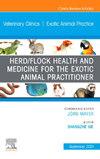外来动物胃肠病学治疗。
Q2 Veterinary
Veterinary Clinics of North America - Exotic Animal Practice
Pub Date : 2024-12-26
DOI:10.1016/j.cvex.2024.11.011
引用次数: 0
摘要
本文综述了外来伴侣哺乳动物、鸟类、爬行动物、两栖动物和鱼类胃肠道疾病的治疗。胃肠淤积的治疗包括补液、营养和镇痛;很少有证据表明促生剂是有用的。研究已经评估了几种外来动物的食欲刺激剂的功效。虽然兔子和啮齿类动物不能呕吐,但马洛匹坦可能通过提供内脏镇痛而有益。胃保护剂可能适用于有胃肠道溃疡风险的患者,如厌食性鹦鹉。免疫抑制剂可能适用于胃肠道肿瘤和炎症性肠病。本文章由计算机程序翻译,如有差异,请以英文原文为准。
Therapies in Exotic Animal Gastroenterology
求助全文
通过发布文献求助,成功后即可免费获取论文全文。
去求助
来源期刊

Veterinary Clinics of North America - Exotic Animal Practice
Veterinary-Small Animals
CiteScore
2.20
自引率
0.00%
发文量
56
期刊介绍:
Comprehensive, state-of-the-art reviews by experts in the field provide current, practical information on the diagnosis and treatment of conditions affecting exotic animals. Each issue of Veterinary Clinics: Exotic Animal Practice focuses on a single topic relevant to your veterinary medicine practice, from diagnosis through medical management and surgical interventions. Topics include wound healing, oncology, internal medicine, fungal diseases, infectious diseases, pain management, dermatology, behavior, surgery, respiratory medicine, and pharmacology.
 求助内容:
求助内容: 应助结果提醒方式:
应助结果提醒方式:


